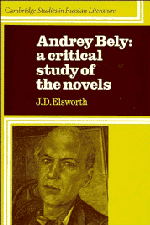Summary
It was not until the end of the decade of Symbolism that Bely turned to the writing of novels. Up till 1909 he was known as a poet, a theoretician of the Symbolist movement, and the author of four experimental prose works which he entitled ‘Symphonies’. It was with his Second, or Dramatic Symphony that he made his literary debut in 1902 (his First, or Heroic Symphony, though written first, was not published until 1904).
The appearance of the Second Symphony almost coincided with the publication of Bely's first theoretical essay, ‘The Forms of Art’, in which he declared that all art forms were evolving towards music. In a brief and cryptic preface he wrote of the Symphony's possessing three meanings, or aspects: the musical, the satirical, and the philosophical or symbolic. The musical aspect he sees as stemming from the task of expressing a series of moods, which are linked to each other through a basic mood, or key. By ‘mood’ Bely evidently has in mind something more than a subjective emotional condition, but it is not readily clear precisely what. In the introduction to the Fourth Symphony, however, he writes of his attempt ‘to delineate as clearly as possible certain experiences which underlie, as it were, everyday life and essentially cannot be embodied in images’. It then becomes easier to see that these experiences are that which he refers to in his theoretical works as ‘inner’ or ‘mystical’ experience, which is the true ground of communion between men and eludes embodiment in language understood purely as a referential system.
- Type
- Chapter
- Information
- Audrey BelyA Critical Study of the Novels, pp. 55 - 87Publisher: Cambridge University PressPrint publication year: 1983
- 1
- Cited by



